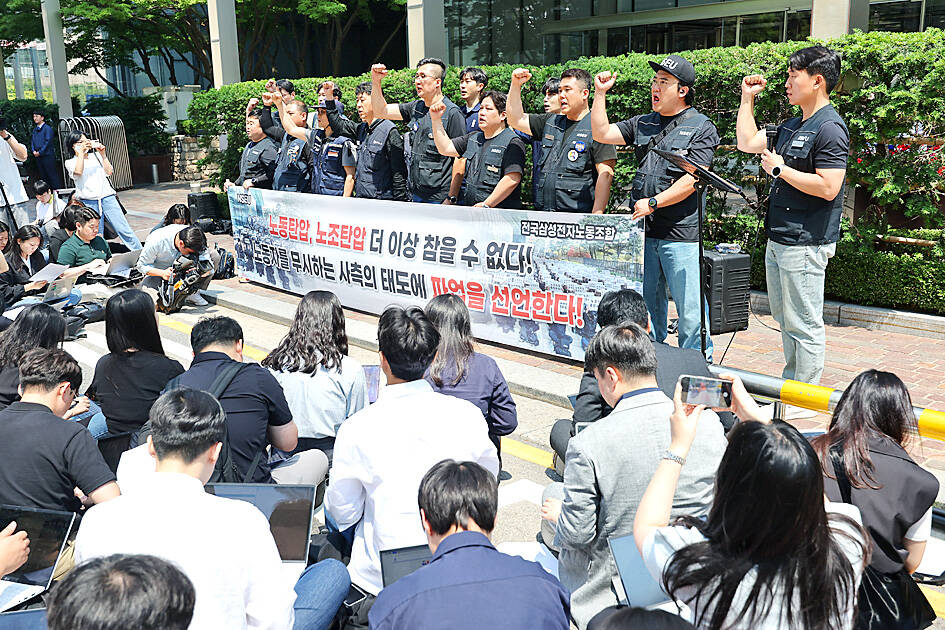Samsung Electronics Co’s labor union yesterday said it plans to carry out its first-ever strike, adding to the challenges for South Korea’s largest company as it seeks to recover from setbacks in its semiconductor business.
The National Samsung Electronics Union, the largest of the tech giant’s several unions with about 28,000 workers, announced the decision after wage negotiations with management stalled. The two sides have been in discussions since the start of this year, but have failed to resolve their differences.
“What we want is not a 1 to 2 percent wage increase. What we want is to be paid fairly for the amount of work done,” the union said in a statement in front of Samsung’s offices in Seoul. “We want to be compensated for our labor fairly and transparently.”

Photo: EPA-EFE
The union’s decision comes as Samsung, led by executive chairman Jay Y. Lee, finds itself in the unusual position of playing catch-up in a key sector of the chips industry. Local rival SK Hynix Inc has jumped out to an early lead in the memory chips that are used for the development of artificial intelligence services, a booming sector of the business.
“The company remains committed to engaging in good faith negotiations with the unions, and is making every sincere effort to an agreement,” Samsung said in a statement.
It is unclear how the union action would affect Samsung’s business. Some of the union workers plan to skip work on Friday next week. Union leaders say they have estimated the number of workers who would participate internally, but declined to specify the figure.
They have plans for a subsequent strike if management declines to engage in talks, but would not reveal the date.
The first strike day is a Friday, between a Thursday holiday and the weekend, so the absences would let workers take an extended break. Union leaders do not expect a significant impact on production lines for chips and other electronics as much of the operation is automated and Samsung has an extensive workforce.
The union wants top management, including Lee, to take their views more seriously. The heir of the company’s founding family pledged in 2020 to end its past practices of suppressing organized labor activities.
“Despite chairman Jay Y. Lee’s declaration that nonunion management will be eliminated, there is no change in the management’s attitude,” the union said. “We can no longer stand by the company’s lack of will to negotiate.”
Union head Son Woo-mok said that one of the key issues in negotiations is bonus payments.
In March, Samsung’s labor-management council decided to increase this year’s pay by 5.1 percent, as South Korea has been working to contain inflation in the past few months, like many other countries.
Unionized workers have drawn a public backlash after holding a concert-like rally with performances by celebrities in Seoul last week. Samsung Electronics has not had a strike since its founding in 1969.

When an apartment comes up for rent in Germany’s big cities, hundreds of prospective tenants often queue down the street to view it, but the acute shortage of affordable housing is getting scant attention ahead of today’s snap general election. “Housing is one of the main problems for people, but nobody talks about it, nobody takes it seriously,” said Andreas Ibel, president of Build Europe, an association representing housing developers. Migration and the sluggish economy top the list of voters’ concerns, but analysts say housing policy fails to break through as returns on investment take time to register, making the

NOT TO WORRY: Some people are concerned funds might continue moving out of the country, but the central bank said financial account outflows are not unusual in Taiwan Taiwan’s outbound investments hit a new high last year due to investments made by contract chipmaker Taiwan Semiconductor Manufacturing Co (TSMC, 台積電) and other major manufacturers to boost global expansion, the central bank said on Thursday. The net increase in outbound investments last year reached a record US$21.05 billion, while the net increase in outbound investments by Taiwanese residents reached a record US$31.98 billion, central bank data showed. Chen Fei-wen (陳斐紋), deputy director of the central bank’s Department of Economic Research, said the increase was largely due to TSMC’s efforts to expand production in the US and Japan. Investments by Vanguard International

WARNING SHOT: The US president has threatened to impose 25 percent tariffs on all imported vehicles, and similar or higher duties on pharmaceuticals and semiconductors US President Donald Trump on Wednesday suggested that a trade deal with China was “possible” — a key target in the US leader’s tariffs policy. The US in 2020 had already agreed to “a great trade deal with China” and a new deal was “possible,” Trump said. Trump said he expected Chinese President Xi Jinping (習近平) to visit the US, without giving a timeline for his trip. Trump also said that he was talking to China about TikTok, as the US seeks to broker a sale of the popular app owned by Chinese firm ByteDance Ltd (字節跳動). Trump last week said that he had

STRUGGLING TO SURVIVE: The group is proposing a consortium of investors, with Tesla as the largest backer, and possibly a minority investment by Hon Hai Precision Nissan Motor Co shares jumped after the Financial Times reported that a high-level Japanese group has drawn up plans to seek investment from Elon Musk’s Tesla Inc to aid the struggling automaker. The group believes the electric vehicle (EV) maker is interested in acquiring Nissan’s plants in the US, the newspaper reported, citing people it did not identify. The proposal envisions a consortium of investors, with Tesla as the largest backer, but also includes the possibility of a minority investment by Hon Hai Precision Industry Co (鴻海精密) to prevent a full takeover by the Apple supplier, the report said. The group is